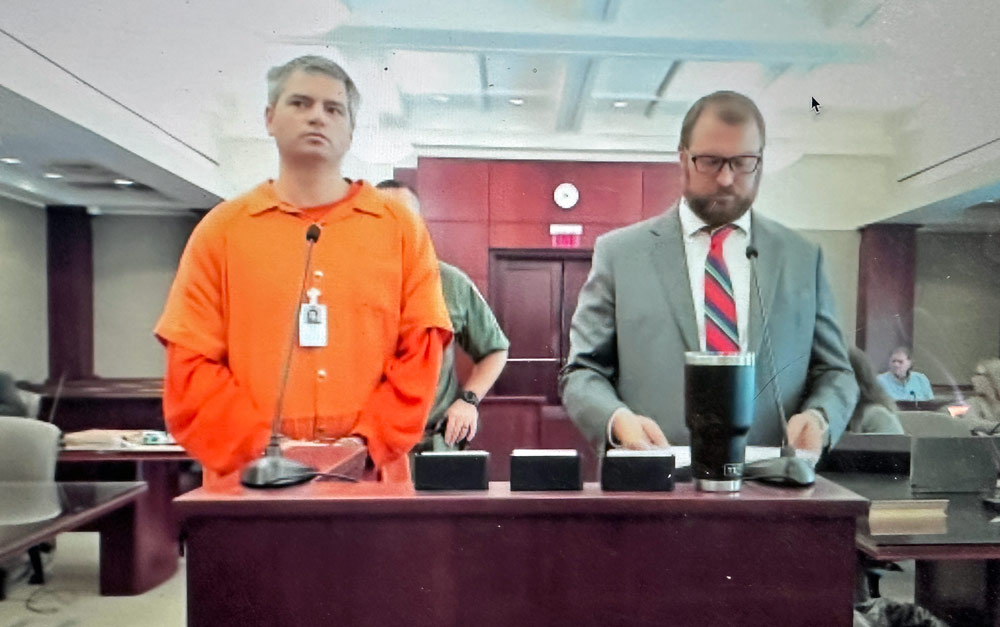He only needed to abide by the directive.
The patience of Circuit Judge Dawn Nichols has been put to the limit.Several times. She was out of it today, and Zachary Tuohey, a 35-year-old father of three and a former wealthy Realtor who drove a Tesla and had never ran afoul of the law before, much less seen the inside of a jail cell, was out of luck.
He received a sentence of three years in prison and eighteen months of rigorous probation from Nichols. It all began when his ex-girlfriend filed for an injunction, which he continued to break. Then he broke his probation several times.
Tuohey’s mother was stunned by the sentencing, and Nichols invited her to leave the courtroom after she lost her temper. However, only last December, his mother was in the courtroom when she heard Nicholas give her, her ex-husband, and Tuohey the following warning: “Stop playing games and stop coming right up to the edge of it, because now you’re on notice here in the courtroom,” the judge informed everyone. You’re under notice.
During his probation, Tuohey didn’t take her seriously. The state offered him two years in prison to settle the most recent infractions, but he declined. He entered an open plea, so Nichols would choose the appropriate sentencing. Four years in prison is what the state requested. More probation was requested by the defense. Nichols made it plain that she was no longer going to be forgiving of him.
Shortly before she sentenced him, Nichols stated that he had every chance to receive assistance while under community supervision. He simply didn’t seize those chances. And I apologize profusely that he didn’t. His family is in my sympathies.
Last year, Tuohey, who lives in Orlando, was seeing a woman in Palm Coast. She ended their relationship. He followed her around. In July of last year, Circuit Judge Chris France granted her request for an injunction. Tuohey sent strange, contentious emails to the court and law enforcement, frequently breaking the injunction.
He was arrested for aggravated stalking, a third-degree crime, in October.
Revocation of bail was the prosecution’s goal. At the hearing last December, Nichols was prepared to do so, but he gave in to Travis Mydock, Tuohey’s lawyer at the time, who contended—in a bizarre, complicated tale that Tuohey’s parents supported—that the most recent infractions were not his fault. In addition to giving her a “you’re on notice” lecture, Nichols conceded and said, “Someone is being cute, and I don’t appreciate it.”
Tuohey broke his probation once more in March when, while working for his father, he drove out of town to Tampa and avoided his GPS monitor, supposedly to see a customer. That amounted to ten infractions. This time, he was taken into custody without posting bail.
Since April 1, he has been incarcerated in Flagler County. The court consented to have psychologist Dr. Jennifer Rohrer assess him.
Nichols’ own prognosis from the bench earlier this year was supported by the study. It all makes perfect sense. Today, the judge stated, “The Good, the Bad, and the Ugly.” It makes plausible that he has a personality disorder and Cluster B features. Cluster B personality disorders, according to the Mayo Clinic, are characterized by a persistently dysfunctional pattern of dramatic, excessively emotional thinking or unexpected conduct, ranging from anger to impulsive, dangerous behavior to fears of abandonment.
Assistant Public Defender Spencer O. Neal, Tuohey’s current lawyer, cited the findings to support his claim that Tuohey required mental health care rather than incarceration. Tuohey’s family had arranged for him to receive outpatient care.
Because the family could not afford the $38,000-per-month inpatient care, Tuohey would receive therapy there five days a week as an outpatient, according to an admissions counselor at Lifeskills, the Orlando mental health institution where he had previously received treatment. However, the Rohrer report had not been examined by the counselor. She didn’t know Tuohey’s criminal history or the charges he was facing, and she had only spoken to his relatives.
According to Tuohey’s mother’s testimony in court, if he were freed, he would live with his family. His family wanted to lessen the tensions that led to his inappropriate behavior. In order to prevent him from breaking his probation by going out of county, as he has done in the past, our family has chosen to help him cut down on those pressures and assist him in making a calendar that details his daily schedule and expectations, she said.
However, the mother acknowledged that Tuohey would be residing in his own home with his kids when Assistant State Attorney Tara Libby asked her to provide specifics about his living arrangements. She assured him that someone would be with him at all times. His family is quite huge, so between his dad, stepdad, siblings, and me, we will make a schedule to make sure he is with someone.
His argument was not helped by that. When he spoke to the court, Tuohey didn’t seem to help himself either.
I had no idea how serious the charges were when I was first arrested and charged. He said that his medicine was helping and added, “I do now.” My mental acuity seems to be increasing. I’m at that point right now, which is obviously not where I need to be or want to be.
Did you realize that everything was about to go haywire? “O Neal,” he said.
No, not at first. “I’m beginning to grasp it now,” Tuohey remarked. His jet-black hair from last December, while he was still on probation, had turned to gray as he stood beside O Neal at the lectern, facing the judge in his orange jail uniform.
The victim used Zoom to testify. She admitted to the court that she still feared him. He didn’t appear to be following the court’s orders or showing respect. If he was released on probation, she at least wanted him to be monitored by a GPS unit (again).
O Neal requested that the court grant him another chance to successfully complete probation. “The most striking thing about our meeting was when he looked at me and told me that he didn’t really comprehend how serious it was going to get,” O Neal told the court when he first spoke with Tuohey after becoming his counsel (after receiving an odd letter from him). He was facing a severe prison sentence, and I’m not sure if he realized how quickly things were going to go wrong.
Nichols rejected it. Not considering Tuohey’s past and the psychologist’s assessment mentioning his propensity for rebellion and malingering—that is, pretending to be ill in order to avoid accountability.
The judge didn’t act as though he would receive proper care while incarcerated. “I don’t believe he will receive the necessary level of treatment for his personality disorders while he is in custody,” she said. In civilian life, he probably wouldn’t get it either. As the family discovered, receiving that type of specialist treatment for his condition is quite difficult.
She read the passage aloud and then spoke to the family, encouraging them to learn more about the specific type of personality disorder Tuohey suffers from. When you start reading about his theatrical, over-the-top antics, you’ll think, “Oh my God, that’s your brother, that’s your son,” the judge added. This is something that can occasionally run in the family.
“I’m not saying he’s a terrible person,” Nichols went on. He simply hasn’t understood, and unfortunately, incarceration will be necessary for it to become clear to him. And hopefully he never wants to go back there again. You can respectfully disagree as well. I recognize that. But the reality is this court also has to take into consideration that he s a violent felony offender of special concern, and the court has to take into consideration the safety of the community and the safety of the victim.







